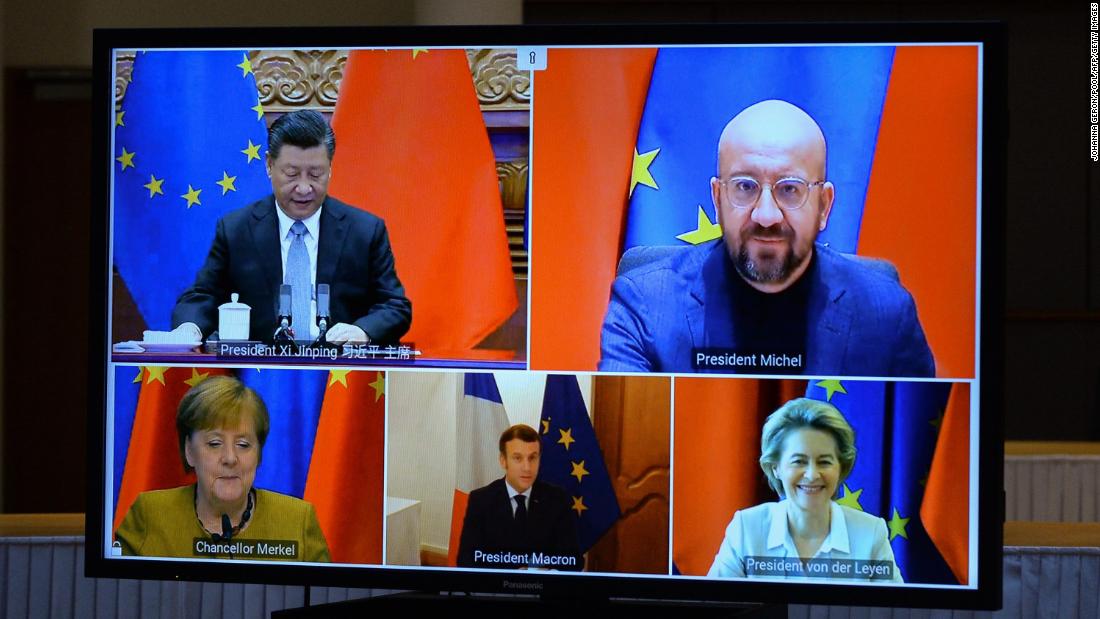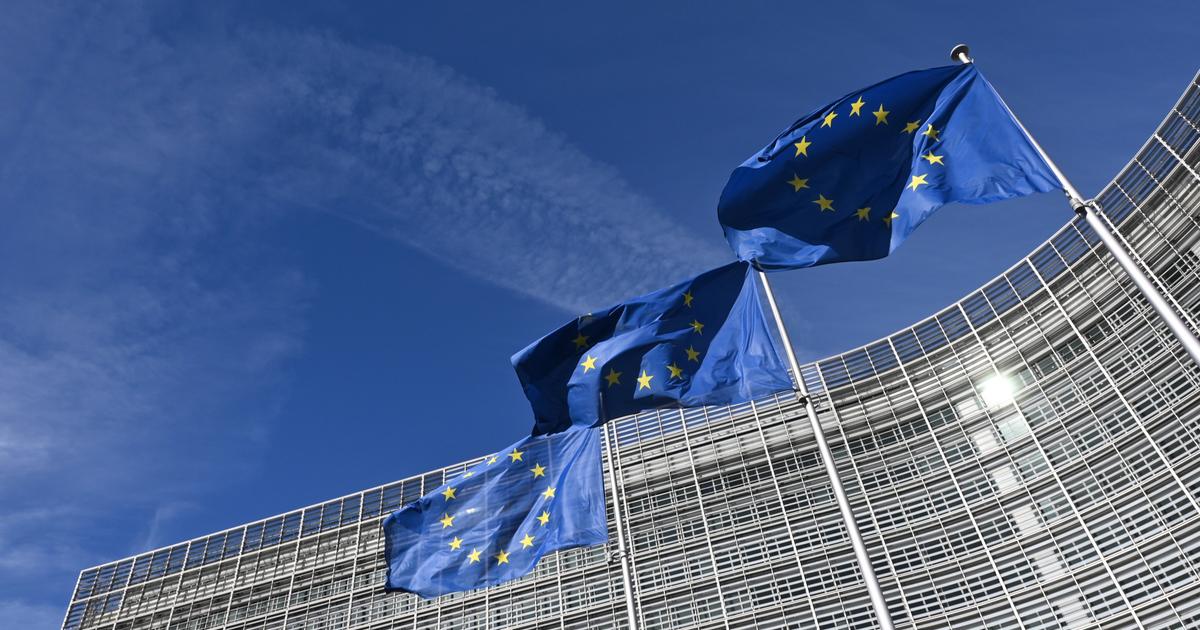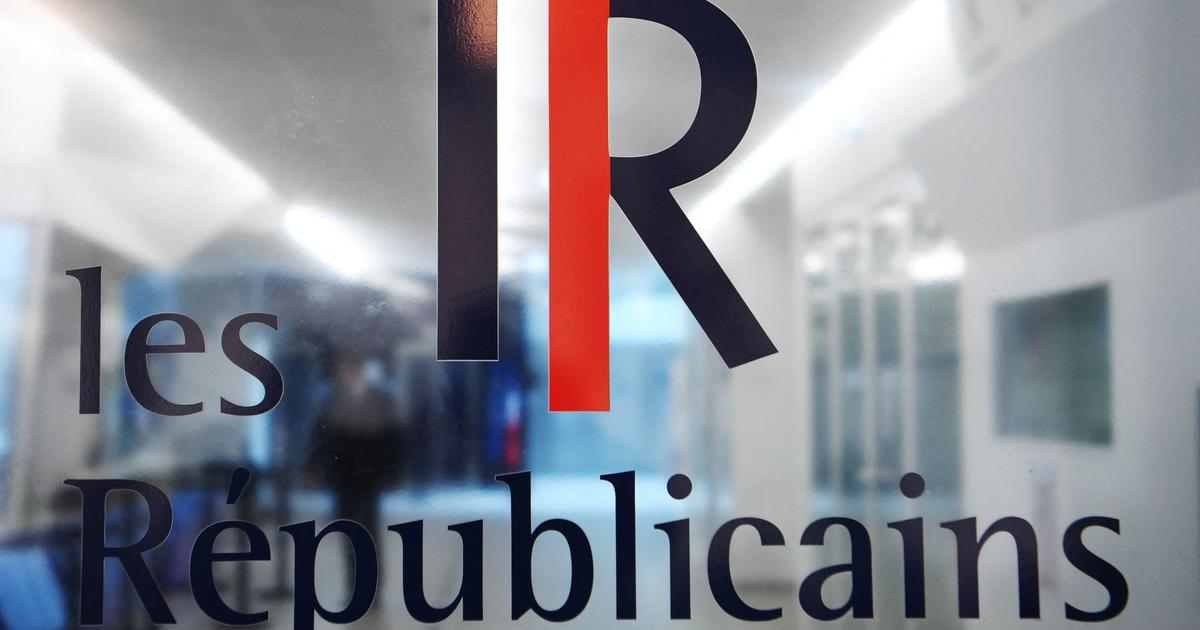China opposes US boycott of Winter Olympics 0:40
(CNN) -
The European Union has long been criticized for trying to have all the benefits without the costs when it comes to dealing with China.
On the one hand, you want to maintain a strong financial relationship with your largest business partner.
On the other, it acknowledges that the Chinese government is a serial human rights violator and a systemic rival.
This attempt to balance contradictory realities has often led to political incoherence in Brussels.
Last year, around this time, the EU and China signed a major investment agreement to strengthen their trade ties.
China rejects US boycott of Winter Olympics
It included a series of commitments that critics called superficial on issues such as climate change, despite the fact that China is the world's largest emitter of greenhouse gases, and labor rights, despite the fact that European lawmakers passed a resolution. a few weeks before the deal condemning the alleged forced labor system of Uighur Muslims in their western region of Xinjiang was closed.
12 months later, the European Parliament does not even consider voting on the agreement.
In March, the EU and other allied countries imposed sanctions on several Chinese Communist Party officials for "serious human rights abuses" against Uighur Muslims, prompting China to sanction several European lawmakers in retaliation.
China has denied the accusations of atrocities in Xinjiang, but as neither side is willing to compromise, the pact is frozen.
The President of the European Commission, Ursula von der Leyen (left), and the Chinese President, Xi Jinping.
Now, a more coherent European strategy is coming to light, through a series of policies that have a clear ambition to counter China, regardless of what it may mean for investment in Europe.
advertising
Last week, the European Commission released a plan called "Global Gateway" to invest 300,000 million euros (US $ 340,000 million) worldwide by 2027 in infrastructure projects, digital connectivity and fight against climate change.
Although the plan does not mention China, it is difficult to see in this announcement anything other than a direct alternative to Beijing's Belt and Road Initiative (BRI), a far-reaching trade and infrastructure project that would unite the economies. from Jakarta to Rotterdam via Nairobi.
Commission President Ursula von der Leyen said the "Global Gate" offered a "real alternative" to China's BRI, which has been accused of burdening some countries with huge debts since its inception in 2013.
The BRI was once seen by some Europeans as a way to inject money into the continent while modernizing its infrastructure, but Beijing's authoritarian turn at home and its hostile foreign policy in recent years have led to radically rethinking whether to have Chinese state-backed companies with significant stakes in critical infrastructure - or allowing European countries to borrow from China - is the best place for Brussels.
The "Global Gate" comes on the heels of a proposal by the EU to strengthen its military capabilities independently of NATO and of the "Indo-Pacific Strategy", a plan to strengthen European influence in the geographical area in which China exercises a significant power.
The President of the European Commission, Ursula von der Leyen, the President of the European Council, Charles Michel, the German Chancellor, Angela Merkel, the French President, Emmanuel Macron, and the Chinese President, Xi Jinping, during a video conference to approve a pact investment between China and the EU on December 30, 2020.
There is no doubt that these tougher policies will upset Beijing. "China likes Europe when it is sitting on the fence," says Theresa Fallon, director of the Center for Russian, European and Asian Studies. "They liked it when Europe wanted a little more autonomy from the United States and a closer relationship with China was part of it. Now the idea of Europeans attending [US President] Joe Biden's summit on democracy. USA], which will point the finger at China, is much less comfortable. "
The new assertiveness of the EU did not emerge suddenly, but was the culmination of several years of changing attitudes.
In 2019, the European Commission published a document calling China a "systemic rival".
Over the next two years, Europe has gradually figured out how to deal with a rival with whom it has so many ties and with whom it continues to want to associate in other areas.
Charles Parton, a former first adviser to the EU delegation in Beijing, believes that Brussels' earlier inaction was largely due to the fact that for a time European leaders were able to get away with doing nothing.
"The reality was that citizens did not exert great pressure on politicians to do something. Either with the persecution of the Uyghurs or the repression in Hong Kong. When Europeans met with Xi Jinping, they said that they brought up the subject of the Uighurs. human rights, everyone would nod and then they would go to work, "he said.
But pressure on European leaders to hold China accountable has been mounting.
And while anti-Chinese sentiment has been rising for years in the West, the ruling Communist Party's management of the initial phases of the COVID-19 pandemic has also sparked a record of negative views toward the country, according to Pew.
Chinese President Xi Jinping (right) and French President Emmanuel Macron (left) taste a wine while visiting the French pavilion during the China International Import Expo in Shanghai in November 2019 .
"Rightly or wrongly, many Western politicians have portrayed China as responsible for what happened. And Beijing has not helped this perception by promoting disinformation about covid-19. Now, politicians and citizens are more susceptible to seeing to China for what it really is, "Parton said.
Historically, it has also been difficult for Member States and EU institutions to agree on a common policy on China. This further complicates matters: China is the largest trading partner of the richest and possibly most powerful member state of the EU, Germany. German diplomats have historically downplayed tensions with China and, in economic matters, German ministers are listened to attentively by everyone in Brussels and often set an agenda that is followed by other member states.
"As the EU's foreign policy requires unanimity, one is forced to move at the pace of the slower member state," says Ian Bond, director of foreign policy at the Center for European Reform.
"China has successfully hung carrots in front of member states that have happily picked those carrots."
Bond also notes that former US President Donald Trump's unpopularity in Europe, combined with his frank hostility towards China, encouraged the EU to work more closely with Beijing at a time when Europe was actively pursuing a foreign policy independent of the United States.
"Sometimes when the wrong person is saying the right things, it can have the opposite effect as desired. I think Europe initially saw working with China as an opportunity, in light of the instability in the United States. In 2019, it was they realized it was a mistake, "says Bond.
Officials gather near the stage before the opening ceremony of the Belt and Road Forum in Beijing in April 2019.
Today, things are different.
All the G7 countries are more hostile to China, something that, according to Fallon, "embarrassed" the EU representatives at the last summit.
"It was clear that everyone else had come to see China as a serious threat and the EU suddenly seemed very accommodating on this issue," he says.
The Commission, which in recent years had taken a colder line on the US-EU relationship, is now visibly trying to hug Washington tightly.
"The United States will always be an important partner for the EU. It is a kindred country, and we have alliances on almost every issue," an official told CNN this week.
Parton also believes that more and more European leaders have come to realize that Beijing's barking is worse than biting, noting that countries that have been in the pound for hosting the Tibetan Buddhist leader, the Dalai Lama - considered a "separatist" for Beijing - they have not suffered as much as feared, as China's response has been more moderate than its threats.
Another important red line that Europe seems to cross more and more comfortably is to please the self-government of Taiwan.
Mainland China and Taiwan have ruled each other since the end of the Chinese civil war, more than 70 years ago.
Taiwan is now a flourishing multi-party democracy, but the ruling Chinese Communist Party continues to view the island as an inseparable part of its territory, despite never having controlled it.
Former US President Donald Trump (left) and Chinese President Xi leave a business leaders event at the Great Hall of the People in Beijing in November 2017.
Although a Commission official told CNN that Brussels' official policy remains "One China" - loosely described as support for the status quo - the EU sees Taiwan as an attractive partner with whom it hopes to collaborate further. closely, while tensions between Taipei and Beijing rise.
In October, the European Parliament approved a comprehensive plan to improve relations with Taiwan.
This was followed by the arrival of a seven-member delegation from the European Parliament to Taipei in November.
Several member states have also made their support for Taiwan clear, with Lithuania hosting a de facto embassy and Baltic lawmakers making a trip to the island.
A Lithuanian legislator said there is "broad support" in his country for closer ties with Taiwan.
Furthermore, Parton claims that the cost of the pandemic to the Chinese economy and the increasing headwinds on the economy mean that it will be even less able to use money as a weapon in the coming years.
It cannot be denied that the recent proposals and positions from Brussels are ambitious and will be poorly received in Beijing.
The question is what happens now.
As Bond points out, any major foreign policy requires the unanimity of member states, and China has done a good job of turning the heads of certain leaders, most notably Hungarian Viktor Orban, whose plans to build a branch of a Chinese university in abroad in the Hungarian capital, Budapest, sparked protests during the summer.
The government has since said it will hold a referendum to decide whether to go ahead with the university's plan.
Controversies surrounding the Beijing Winter Olympics 2:38
However, the shift in public opinion towards China is trickling down to European leaders.
Fallon believes that in countries that have historically been in favor of economic partnerships with China, such as France and Hungary, which have upcoming elections, the political opposition will be able to take advantage of public hostility.
The danger is not that there is no coherent strategy for China, but that the plan becomes so diluted that it is not worth the paper it is written on.
In the case of the "Global Port", it could be private sector companies reluctant to finance huge infrastructure projects that do not generate money.
As for security, it may be that southern European countries enjoy Chinese money and do not see it geographically as a threat.
For now, China's hawks are glad that Brussels is trying to stop trampling on its lofty ambitions to promote democracy, human rights and free trade, blinded by the signs of the Chinese yuan in its eyes.
What remains to be seen is whether the EU's own bureaucracy and processes stifle that ambition, and whether once the pandemic starts to subside, Europe reverts to its old nasty habit of turning a blind eye, even when doing so hurts its own. long-term interests.
European Union






